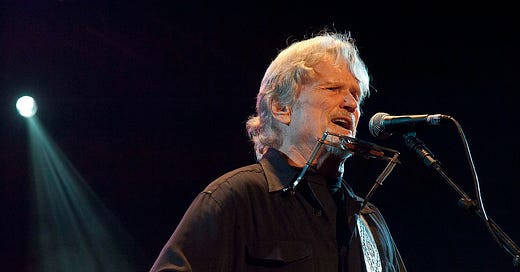On Kris Kristofferson, 1936-2024
In gratitude for his influence, his music, and the strength of his commitment.
I’ve been researching something that has taken me more time than expected, or I would have written about Kris Kristofferson already. I can’t write a full piece about him yet, but I can at least spare a moment to remember him. He was important to me. Kristofferson was a big influence in my teens, at an age when I was developing tastes and ambitions that would last for a lifetime.
I had already experienced two revelatory moments regarding country music when I discovered Kristofferson. The first was seeing Merle Haggard sing “Mama Tried” on television, at a time when I knew almost nothing about country music. The beauty of the song made me realize how much country music had to offer. The quiet intensity of the man made the extravagant showmanship of sixties-era rock stars seem pale by comparison.
The next step in my conversion came a week or two later, when I saw George Jones on television. I was off and running. I had been teaching myself guitar with my brother Gary’s Beatles songbook that included chord illustrations—first finger goes here, second one there—and, while I stuck with that songbook, the three-chord directness of country music was the first music that moved me to tears.
I was fifteen years old.
Then came Kristofferson. I began reading about him before I heard him. I bought his first album as soon as it came out. Here was someone who had studied my favorite poet, William Blake, in graduate school. He had thrown away an entire life and career to pursue this music. It was inspiring.
To add light upon light, Kris turned out to be a political radical, recording albums like “Third World Warrior” and writing musical tributes to the Sandinistas and others. The country music world accepted him anyway, both for his musical greatness and because of his fearlessness. (One of the things I learned working for Bernie: fearlessness can sometimes conquer even the most seemingly-insurmountable divides.)
I’d like to write more about him but it’s time to get back to my research. Besides, he’s already been honored the best way any songwriter can be honored: through the great singers who have recorded him. It’s an eclectic and dazzling list that speaks to the universality of his work.
The list includes (in no particular order): Frank Sinatra. Al Green. Elvis Presley. Johnny Cash. Bob Dylan. Janis Joplin. George Jones. Waylon Jennings. Willie Nelson. Jerry Lee Lewis. The Everly Brothers. Randy Travis. Aaron Neville. Ike and Tina Turner. Hey, there’s Isaac Hayes! (My cousin and my producer will be upset with me if I leave out the Grateful Dead. Here they are.)
Now that’s what I call a tribute.
I’ve thought about recording and posting one of his songs to honor him, the way I did with Kinky Friedman (although I knew Kinky and never met Kris). Maybe I will when I have a minute (or three).
But which one? I wouldn’t dare touch “Sunday Morning Coming Down,” even though that was the one that most inspired me at the time. I’ve always liked the most country-ish of his country songs, like “Nobody Wins” and “Please Don’t Tell Me How the Story Ends.” I hope I find the time to record something (and suggestions are welcome.)
My mother’s favorites were “For the Good Times” and “Loving Her Was Easier Than Anything I’ll Ever Do Again” (her marriage wasn’t going well), and what better reason to sing a country song than in memory of your mother?
Look at that. I wrote something about Kris after all.
Photograph by Bryan Ledgard, licensing via Creative Commons.



